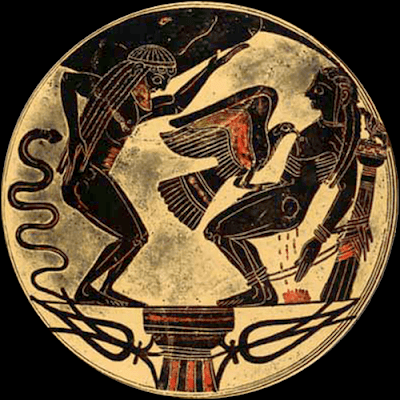PROMETHEUS could not bear to see his people suffer and he decided to steal fire, though he knew that Zeus would punish him severely. He went up to Olympus, took a glowing ember from the sacred hearth, and hid it in a hollow stalk of fennel. He carried it down to earth, gave it to mankind, and told them never to let the light from Olympus die out. No longer did men shiver in the cold of the night, and the beasts feared the light of the fire and did not dare to attack them.
A strange thing happened: as men lifted their eyes from the ground and watched the smoke from their fires spiraling upward, their thoughts rose with it up to the heavens. They began to wonder and think, and were no longer earth-bound clods. They built temples to honor the gods and, wanting to share what they had with them, they burned the best pieces of meat on their altars.
Zeus was furious when he first saw the fires flickering on earth, but he was appeased when the savory scent of roast meat reached his nostrils. All the gods loved the smell of the burnt offerings; it spiced their daily food of ambrosia and nectar. But Prometheus knew how hard men worked to make their living and thought it a pity that they burned up the best parts of their food. He told them to butcher an ox and divide the meat in two equal heaps. In one were the chops and roasts, hidden under sinews and bones. In the other were scraps and entrails, covered with snow-white fat. Prometheus then invited Zeus to come down to earth and choose for himself which part he wanted for his burnt offerings. Zeus, of course, chose the best- looking heap, but when he discovered that he had been tricked he grew very angry. Not only had Prometheus stolen the sacred fire and given it to men, he had also taught them to cheat the gods. He resolved to punish both Prometheus and his creations.
Cast in unbreakable irons, Prometheus was chained to the top of the Caucasus Mountains. Every day an eagle swooped out of the sky and ate his liver. At night his immortal liver grew anew, but every day the eagle returned and he had to suffer again.
Thus was Prometheus punished. But Zeus found a more subtle way to punish the mortals. He sent to earth a beautiful but silly woman. Her name was Pandora.
A strange thing happened: as men lifted their eyes from the ground and watched the smoke from their fires spiraling upward, their thoughts rose with it up to the heavens. They began to wonder and think, and were no longer earth-bound clods. They built temples to honor the gods and, wanting to share what they had with them, they burned the best pieces of meat on their altars.
Zeus was furious when he first saw the fires flickering on earth, but he was appeased when the savory scent of roast meat reached his nostrils. All the gods loved the smell of the burnt offerings; it spiced their daily food of ambrosia and nectar. But Prometheus knew how hard men worked to make their living and thought it a pity that they burned up the best parts of their food. He told them to butcher an ox and divide the meat in two equal heaps. In one were the chops and roasts, hidden under sinews and bones. In the other were scraps and entrails, covered with snow-white fat. Prometheus then invited Zeus to come down to earth and choose for himself which part he wanted for his burnt offerings. Zeus, of course, chose the best- looking heap, but when he discovered that he had been tricked he grew very angry. Not only had Prometheus stolen the sacred fire and given it to men, he had also taught them to cheat the gods. He resolved to punish both Prometheus and his creations.
Cast in unbreakable irons, Prometheus was chained to the top of the Caucasus Mountains. Every day an eagle swooped out of the sky and ate his liver. At night his immortal liver grew anew, but every day the eagle returned and he had to suffer again.
Thus was Prometheus punished. But Zeus found a more subtle way to punish the mortals. He sent to earth a beautiful but silly woman. Her name was Pandora.



Comments
Post a Comment